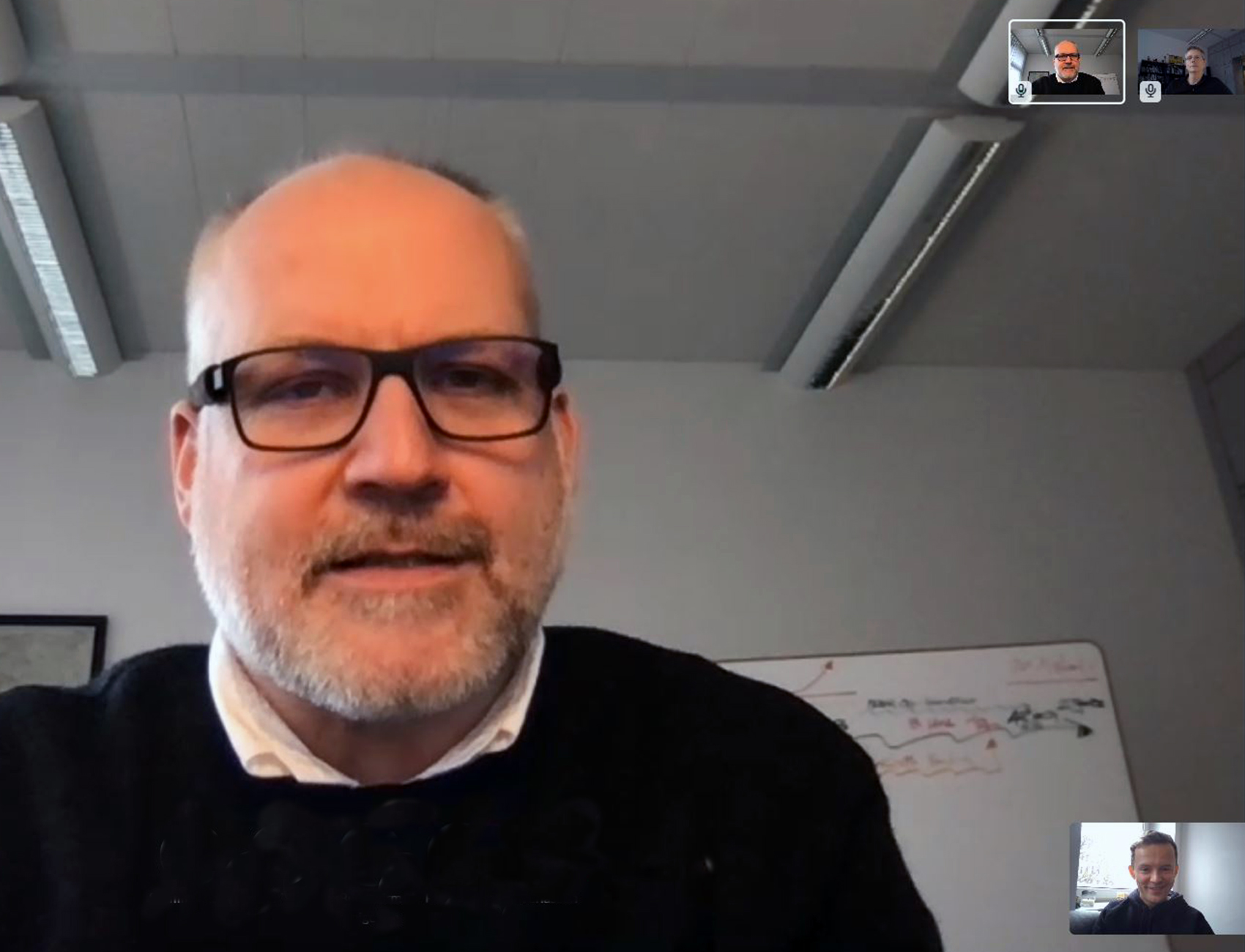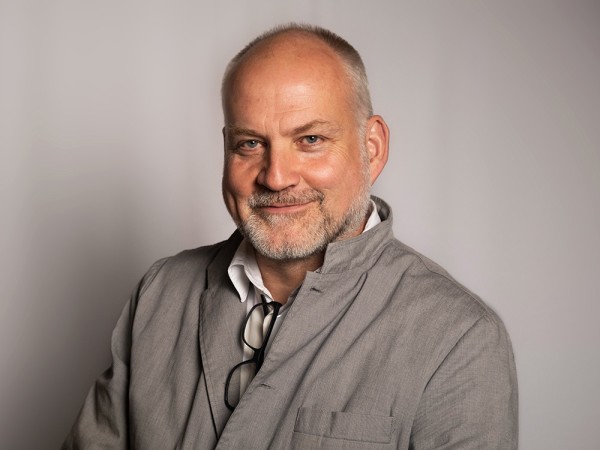
“Water was, still is and will remain a key issue of urban development.”
Professor Jochen Rabe is an acknowledged expert in sustainable urban development and digitalisation. In his 20-year career, including 10 years in the UK, he realised numerous interdisciplinary research projects and built up and managed professional counselling teams for large companies. He studied at the universities of Cambridge, Oxford and Hamburg and for three years he has been holding a professorship for Urban Resilience and Digitalisation at the inter-university Einstein Center Digital Future (ECDF) in Berlin. He will remain with the ECDF in addition to his new role as KWB’s managing director. His research focuses on the “Rapid Transformation of Cities through Digitalisation in Economy, Infrastructure and Environment” and also on “Green/blue Infrastructures”.
Jochen, you’ve been working with us since June 1st – how do you like it and what is your vision for the future of the KWB?
I am delighted about having met with a brilliant multiskilled and multitalented team. It confirms my vision of turning KWB into a driver for innovations in the water sector. In my opinion, this includes a particular focus on the digitalisation of interfaces, circular economy and sustainability, both in Berlin and beyond. I am convinced that the KWB, as an application-orientated research institution, is predestined to react very quickly to the demands of the constant change. So, in our role as a think tank, we are able to share knowledge and solutions with our network partners. At the same time however, it has to be taken into consideration that our commitment to these issues has to be supported by society. Therefore, the communication with citizens is becoming increasingly important for us.
One of your main research areas is “urban resilience”. What exactly are the issues?
Let’s start with the term “resilience”, which has finally received some more attention due to the pandemic. In general, it is about the ability to adapt to change. The focus is not on disasters only, in the water sector this would be flooding, for example. The term rather describes how societies can adapt to ever faster changing critical processes, without losing the sense for what they are made up of. Digitalisation itself is of course a driver whose perception is rather critical in some areas. On the other hand, digitalisation also offers many solutions to facilitate urgently required changes to achieve the climate goals. Particularly with a view to urban infrastructures, which are usually designed for a long-term use, or to existing governance structures, a completely new approach is necessary in order to face the emerging changes at an appropriate speed. This requires a fundamental restructuring of governance processes and a rethinking of technologies and infrastructures. The latter must not be an end in itself!
The precautionary principle is the guiding principle of Germany’s water management: Water bodies must be managed in compliance with the ecosystem in such a way that evitable impairments of its ecological functions are prevented. Is resilience synonymous with this priority?
The precautionary principle basically pursues sustainability goals. In fact, I am currently observing that a lot is being said about resilience and sustainability as a result of the pandemic, but people do not realise that in substance, these two terms are not identical. Sustainability is a normative concept of our society, as become manifest, for example, in the 17 sustainability goals of the UN. Resilience, on the other hand, is not normative, but rather a strategic approach for municipalities to being able to respond adequately to the emerging change, or in the best case, to having the necessary resilience to design and implement the required transformations. One strategy to achieve enhanced resilience is to have reserves. If you haven’t got any reserves, such as resources or storage capacities in the city, you are less resilient and therefore more vulnerable when having to face emerging changes. On the other hand, in simplified terms, sustainability could be put in a level with efficiency. So, the question is: how shall we use our scarce resources in the most efficient way? However, this might result in the fact that we would maintain fewer reserves than required by a consistent resilience-based strategy. Briefly speaking: resilience is actually not a synonym for the precautionary principle. So, maintaining sufficient resilience for the transformation towards a more sustainable city has to be the aim of successful water management.
Droughts and heavy rainfalls have demonstrated that the adaptive capacities of water infrastructures are limited. What research activities will be necessary to strengthen the resilience of cities against climate changes? What will KWB’s tasks be in this respect?
In the water sector, we often have to deal with widespread and sometimes very decentralised systems. I think this is where digitalisation comes into play, which helps to better understand and operate these systems and to discover their untapped capacities. Basically, the systems, for example in rainwater management, are well understood in isolated areas. But in terms of their network functioning throughout the city there is still a knowledge gap which needs to be closed. And on top of that, it has to be investigated how existing capacities can be reliably made available. This particularly applies to blue-green-grey infrastructures which have been available for some time already and which are by definition a decentralised scheme. The major challenge in this context has always been to achieve the evidence-based availability of these decentralised structures to facilitate their targeted control. So, we have work to do. But the KWB has already prepared the ground and will certainly continue its efforts in this field.
Jochen, it has been certainly most challenging to take over the KWB management during pandemic times. Can the corona crisis with the global shutdowns perhaps also be used as a huge field test for urban resilience?
To a certain extent, yes. In terms of resilience, we need to distinguish between shock and crisis. The initial lockdown was of course a shock for the systems at first. But at the same time the response to it actually induced a change. The pandemic has kickstarted working from home, whereas before this was rather an occasional option. I therefore believe that we will see essential and permanent changes in the world of work. Also, the KWB staff has experienced a good work productivity during the lockdown. Nevertheless, we have also learned when to meet physically. As a driver of innovation, we have successfully tested new communication platforms. But I believe that our well-established innovation ecosystem can only be successful in the long term if we have regular but also casual face-to-face meetings. To get back to the initial question: yes, resilience offers opportunities for positive change, but I don’t believe that the “post-corona city” – and by the way also the “smart city” – will look completely different from today’s city. The way we use and operate them will make the difference.
Where can you actually be met if you are not at the Einstein Center or the KWB?
Of course, I’m out and about at many events in the city dealing with water-related issues. In addition, I have been appointed to advise the Berlin municipality on its new Smart City strategy. As a member of the Tempelhof Project advisory board, I support the fascinating site development of the former airport terminal buildings. You also meet me at events of the German Federal Ministry of the Interior, Building and Community, where I am busy integrating water issues into the Smart Cities debate. This is something that happens all too rarely!
In my free time you can find me in the countryside, hiking all around. The digital world is fascinating, but water is perhaps somewhat more essential for the individual and closer to the soul. I feel privileged to have the opportunity to combine these two fields in my work both at KWB and ECDF.
Moritz Lembke-Özer and Bodo Weigert asked the questions.


